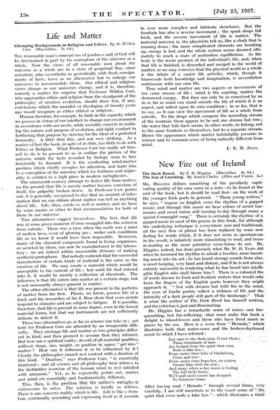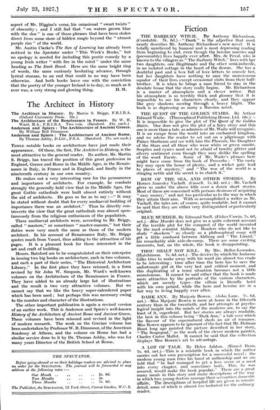New Fire out of Ireland
The Dark Breed. By F. R. Higgins. (Macmillan. 3s. Cs.L) The Son of Learning. By Austin Clarke. (Allen and Unwin. 5s.) Mn. HIGGINS defines something of the peculiarly capti- vating quality of his own verse in a note—to be found at the end of the book, but it .should be read first—on the work of the younger Irish poets in general. " These young writers," he says, " impose on English verse the rhythm of a gapped music, and through this music we hear echoes of secret har- monies and sweet twists still turning to-day through many a` quaint Connaught song." There is certainly the rhythm of a gapped music in most of the poems in this book, for although the underlying technique is everywhere sure and traditional, all the easy flow of phrase has been replaced by some new feeling for words which, if it does not seem so spontaneous in the result, is infinitely more stimulating to read, and bears re-reading as the more . primitive verse-forms do not. Mr. Higgins, indeed, has done precisely what Mr. W. B. Yeats did when he loosened his rhythm to admit a lovelier, more haunt- ing music into his art ; he has heard strange sounds from afar, a sweet harping, very faint and distant, and if he is not ahvays• entirely successful-in rendering what he has heard into intelli- gible English who shall blame him '? There is a coloured fire of words known to Irish-and- Scottish writers that would only burn the • fingers of the English poets however they might approach it. " Not with dreams but with fire in the mind,' the eyes of Gaelic poetry reflect a richness of life and the intensity of a dark people still part of the landscape." That is what the author of The Dark Breed has himself written, and the criticism is just and illuminating.
Mr. -Higgins has -a remarkable sense of water—not fire- quenching, but fire-reflecting--that must make- this book' delight to island-lovers and those who have lived much in- places by the sea. Here is a verse from " Hermits," 'which illustrates both that water-sense and the- broken-rhythmed. •
music to which I have referred : .
• Lay oars to the thole pins, 0 row-thew;
These.townlands of men - - -- Are hedged from the quiet that even Nods a lake hen ; From under their hills of blackthorn, Come and row : - - --
From under close branches, on Waters Grown blue with the-sloh: And away, when day moon is fooling The full birds home,
We'll pull until sunset has dropped To luminous foam.
After having read "Hermits " through several times, very . carefully, I am still uncertain as to the exact sense of"" the . quiet that even nods a lake hen "—which illustrates. a third
aspect of Mr. Higgins's verse, his occasional " sweet twists " of obscurity ; and I still feel that " on. waters grown blue with the sloe " is one of those phrases that have been stolen direct from some store of hidden magic beyond the " utmost purple rim " of the world.
Mr. Austin Clarke's The Son of Learning has already been noticed in the Spectator under " This Week's Books," but no apology is needed for including this poetic comedy by a young Irish writer " with fire in the mind " under the same heading as The Dark Breed. Here are the same bright ring of words, the same curiously hesitating advance, through lyrical stanzas, to an end that could in no way have been otherwise. And both books leave one with the conviction that the poetry of the younger Ireland is to-day, as much as it
ever was, a very strong and glowing thing. H. M.























































 Previous page
Previous page